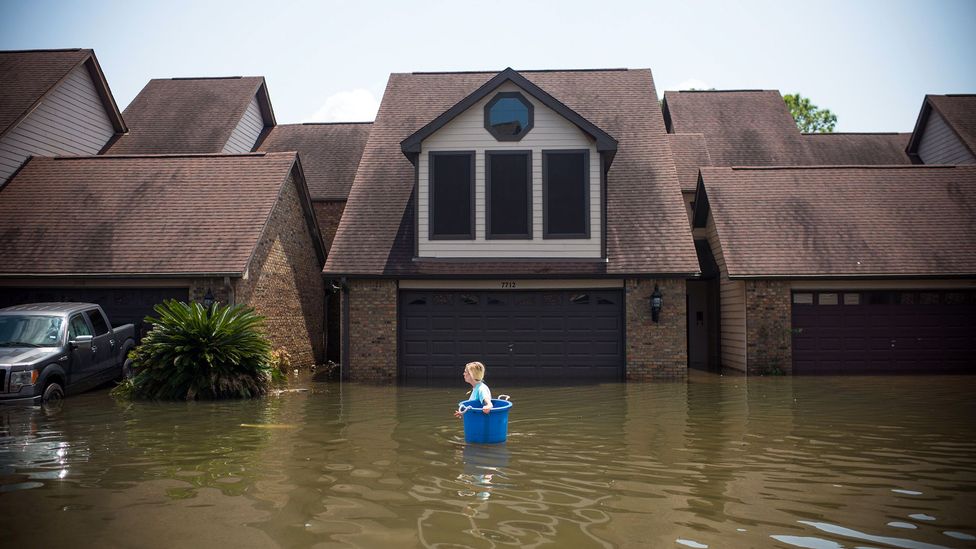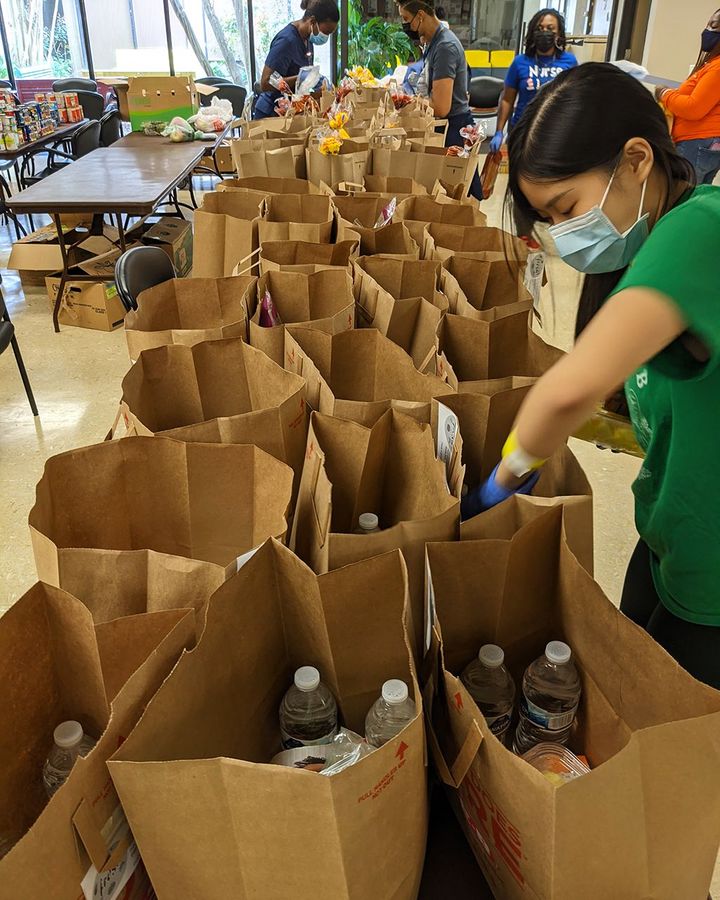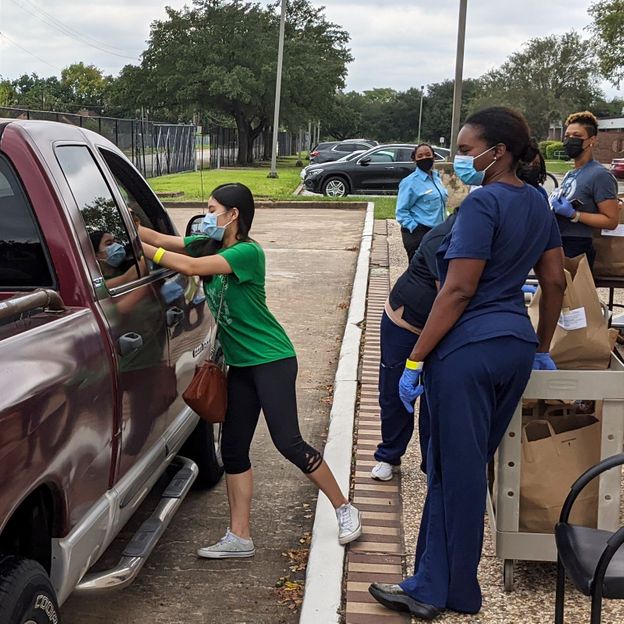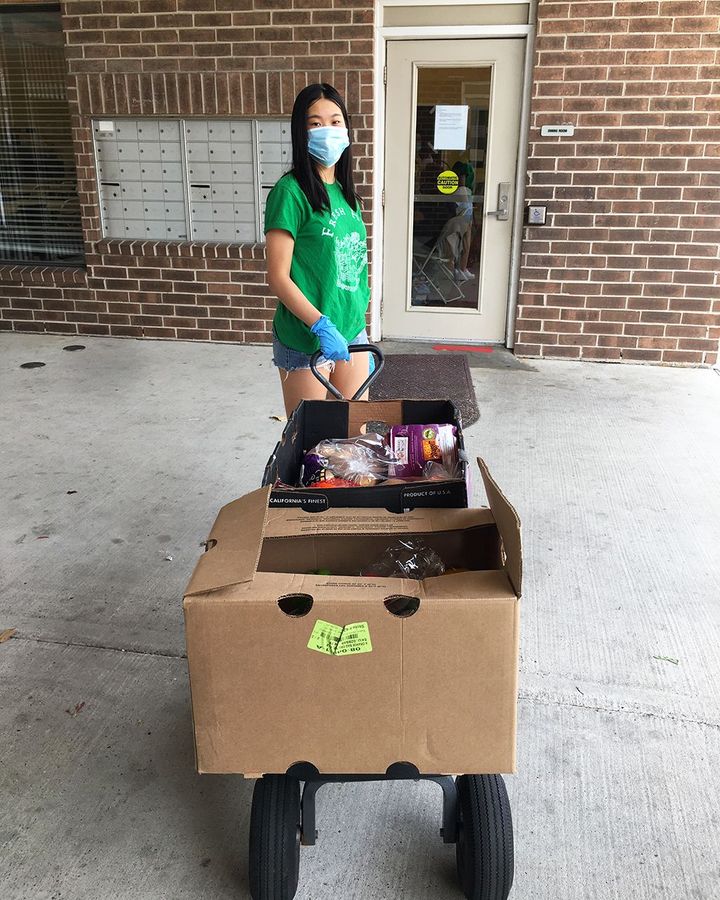It was a story about broccoli soup that really brought home to Shirley Zhu the value of the work she was doing. She and her twin sister Annie, who are 18, were delivering boxes of food to people struggling to get affordable, nutritious food in their home city of Houston, Texas. One woman, who Shirley was visiting for the second time, was excited to tell her that she had made broccoli soup for her and her young daughter with the previous food package.
"It was heartening to see that even giving people a bag of produce can have an effect and positively impact their lives," says Shirley. It demonstrated the power of fresh food – not just for improving health, but in bringing families closer together by encouraging them to cook and eat together. "When people just have access to convenience store junk food and fast food that's cheap and convenient, I think that it also breeds an emotional toll on families," she says.
Shirley and Annie were 15 years old when in 2017 they began collecting unsold food from grocery stores and bakeries in Houston and distributing it to residents living in "food deserts" – areas which don't have good access to fresh, affordable food. Together with an initial team of 10 classmates at their high school, they set up Fresh Hub. With the help of a smartphone app and automated messaging service, they were able to alert residents when fresh food was available.
The idea was catalysed by a devastating natural disaster.
In August 2017, Hurricane Harvey swept through Texas bringing 130mph (209km/h) winds and dumping more than 5ft (1.5m) of rain on some parts of the state. The largest hurricane to hit Texas for more than 50 years, it caused catastrophic flooding and killed 68 people. At its peak, nearly one-third of Houston was under water.
The disaster was an awakening for Annie and Shirley. While their neighbourhood escaped the worst effects, they saw desperate need throughout the city as nearly 135,000 homes were destroyed or damaged, forcing tens of thousands of people into temporary shelters. The Zhus took in two families whose homes had been flooded.

Hurricane Harvey left nearly one third of Houston under water and forced thousands of people from their homes (Credit: Emily Kask/AFP/Getty Images)
"In the aftermath of the storm, there was a huge shock factor to me because I had sort of known that there was inequality beforehand, but I've never seen it or experienced it so up close," says Annie.
As the water receded and rebuilding efforts started, the sisters volunteered to help clear up grocery stores, where they saw vast amounts of food being thrown away. It felt perverse to Shirley, "seeing that all that food was being thrown out at grocery stores and then simultaneously there are people, there are families in homes, who are in need of food".
This situation is repeated around the world. Around 2.5 billion tonnes of food is lost or wasted each year, approximately 40% of all food produced, according to a WWF report. It's a disaster on many counts. Not only could this food help tackle the food insecurity affecting hundreds of millions of people worldwide, but it also has a climate impact: food waste is estimated to generate up to 10% of greenhouse gas emissions.
Shirley's experience at the grocery store triggered what she describes as a puzzle piece falling into place: there must be a way to tackle both issues at once – by rescuing perfectly edible but unused food and delivering it to those who need it, while at the same time benefiting the climate.
You might also like:
- The long term effects of going hungry
- How offices can provide homes to bees
- The homes powered by passing pedestrians
Annie and Shirley started brainstorming in their bedroom, running through ways they could redistribute excess healthy food at community events. They contacted grocery stores and even farmers, but found themselves turned down because they weren't a registered charity, or because the logistics weren't there, or sometimes simply because, as two 15-year-olds, they weren't taken seriously. "We're just high-schoolers and we didn't have a lot of credibility," says Shirley.
They switched tactics. Instead of trying to build something from the ground up, they decided to join forces with an organisation already doing this work. Second Servings, a Houston-based non-profit, already had the vans, the equipment, and the expertise in rescuing food, which it donates to non-profits, soup kitchens, homeless shelters and other places of need. What it didn't do was hold events.
Barbara Bronstein, the founder of Second Servings, says she jumped at the chance to collaborate when Shirley and Annie approached her. "They were going to be going to community centres which we were typically not going to, so that would extend our reach."
Bronstein, who the sisters describe as one of their biggest mentors, was immediately struck by their passion and organisation. "These girls are something else and just very dedicated," she says.
Shirley and Annie's desire to help those facing food insecurity is rooted in their family history. When their parents came to the United States from Shanghai in 2002 to study, life was pretty tough. With few resources, they discovered a free groceries programme at a supermarket in Montana, where they were living at the time.
It was a lifeline. But not one that is available to everyone, as Annie discovered when she was talking to a classmate who also had immigrant parents. "He had a very jarringly different story where his family didn't have access so they relied on the cheaper options which happened to be fast food, and so they built a habit of going there," she says. She started to realise the very different way people's food stories play out.
Despite being a wealthy country, where food is abundant, more than 37 million people in the US – over 10% of the population – struggle to access enough nutritious food to be able to have a healthy and active life. Globally, food insecurity is an increasing problem. Up to 811 million people (around 10% of the world's population) faced hunger in 2020, according to the UN, an increase of more than 100 million people from 2019.
In Houston, areas of food insecurity proliferate, with more than 500,000 residents living in food deserts. The problem was already severe before the pandemic, says Bronstein. "But Covid exacerbated the situation." Images of people in Houston queuing for miles in their cars to pick up food donations made international headlines. An estimated one-in-five people in the city are now experiencing food insecurity.
At the same time, up to 40% of food in the US goes uneaten. "That amount of food would be enough to feed 164 million people in the US their full diet every day of the year," says Maddie Keating, a member of the food waste team at Natural Resources Defense Council, an environmental advocacy non-profit.

The volunteers redistribute unwanted but perfectly edible, healthy food to people who needed it (Credit: Fresh Hub)
The environmental impact of all this uneaten food only compounds the tragedy of this.
To produce the food in the first place requires a long chain of processes which all emit carbon dioxide and other greenhouse gases contributing to climate change. Household food waste, which makes up 60% of all food waste, contains the embedded emissions "from the farm, transporting it… packaging, processing, retail, transport to your home, refrigeration, cooking, only to then be transferred to landfill”, says Clementine O'Connor, sustainable food systems programme officer at the United Nations Environment Programme (UNEP). Once the food ends up in landfill it rots, emitting methane, a powerful greenhouse gas.
"[It] is another reason why food waste is a pressing issue," says Shirley, and reducing the environmental impact of uneaten food is also part of Fresh Hub's mission. Last year the sisters won the President's Environmental Youth Award, given out by the US Environmental Protection Agency (EPA), for their work with Fresh Hub.
Pre-pandemic, Annie and Shirley had developed a rhythm for Fresh Hub events. Together with their fellow students (Zaid Ali, Miles Mackenzie, Safia Khan, Amiel Katz, Serena Hou, Angela Ling, David Tang and Samiha Zaman) they would check dates off with Second Servings to make sure they could access the food and would liaise with the Houston Health Department to book a community centre. They'd then pepper the neighbourhood with yard signs advertising the event.
People arriving would sign in, be handed paper bags and then walk the one-way system, choosing what they needed from tables stacked with bread, fruit and vegetables. Attendance varied, but they would usually see around 80 families turning up.
The sisters also invited other organisations – such as Houston Public Library and Texas Workforce, which provides employment services – to set up stalls at the event. "We want to bring a one-stop shop where people get not just food but other resources," says Shirley.
Attendees could also sign up to a text messaging service, to get alerts about future events and the sisters designed an app to provide event locations as well as easy to follow recipes designed by another student at their school using ingredients commonly found at food banks.
As with so much over the past year and a half, however, Covid disrupted Fresh Hub's model. The sisters were determined to keep getting food out, especially as the consequences of the pandemic became starker. People were losing their jobs and struggling to provide for their families. "The need increased," says Annie.
With in-person events off the agenda, the sisters switched to home deliveries, dropping boxes off at people's doorsteps every two weeks. They added a form to their website and app where people could request food deliveries and also worked with the Nurse-Family Partnership, a non-profit helping first-time mothers living in poverty, to reach people in need.
As restrictions eased, they returned to the community centres but switched to monthly drive-through events, with volunteers loading boxes of food into people's car boots.
"Food redistribution is not a new phenomenon, any more than lack of food access is," says Psyche Williams-Forson, associate professor and chair in the department of American studies at the University of Maryland. What is novel, she says, is to see high school students doing it, she says. "I say kudos to them for seeing a need and stepping up."

As restrictions eased during the pandemic, people were able to pick up food at drive in stations organised by Fresh Hub (Fresh Hub)
Yet she urges people to see efforts like Fresh Hub as a catalyst to change policies "so that future generations won't have to take day-old food from the grocery store and distribute it, but rather people will see themselves being self-sufficient and able to thrive".
While Fresh Hub and other initiatives like it play a key role in filling gaps in food waste reduction efforts in cities, adds Keating, truly tackling the problems faced by those living in food insecurity means addressing root causes such as financial disinvestment in communities, poor transportation systems, sky-high healthcare costs and the lack of liveable wages.
Even the use of the term "food desert" has faced criticism in part, for skimming over the fact that areas of food insecurity are the direct result of political decisions. "These 'food deserts' are created by policies, and they're created by capitalism, and they're created by, quite frankly, racism," says Williams-Forson.
The complex knot of issues which contributes to food insecurity is not lost on Annie and Shirley, who both want to use the next stage of their lives – university – to learn more about the systemic reasons for America's fractured food system.
In a couple of months, the sisters will be moving to opposite sides of the country, separated for the first significant period in their lives. Shirley is headed to Harvard University, Massachusetts, where she's planning to study computer science with the aim of building products aimed at reducing inequalities. Annie will be going to Stanford University, California, to study either computer science or symbolic systems (a mix between technology and humanities). She has ambitions to eventually study law, to better understand how politics and legislation could work to combat, rather than exacerbate, food insecurity.

To ensure people could still get access to healthy food during the pandemic, the Fresh Hub team began delivering to people's doors (Credit: Fresh Hub)
They're both committed to continuing their work around food waste and have already identified food rescue organisations running on their respective campuses.
Fresh Hub will continue without them. Shirley and Annie have handed the reins to younger students at their high school, who will keep up the monthly events. The sisters have also had interest from other schools and put together guides on how to set up Fresh Hub-style events.
For now, Annie and Shirley's legacy with Fresh Hub can be expressed in statistics: since 2017 they have led a total of 23 events, mobilised a team of 100 high-school volunteers, saved 15,200 pounds (6,900kg) of food from landfill and served 1,900 Houston residents.
It can also be told in human stories, like one family's broccoli soup lunch or the man in the wheelchair, struggling financially after a serious injury, who sticks in Annie's mind for the joy he brought when he put on an impromptu singing show at a December event.
There is also something very personal for Annie and Shirley, who learned that, while trying to tackle big problems can seem intimidatingly complex, it is possible if you take it one step at a time.
Annie says Hurricane Harvey led to a realisation that changed the way she thinks. "I can't just sit around waiting for other people to find solutions, but I should be part of that movement to create the solution myself," she says.
Shirley echoes the sentiment. "We were used to seeing other adults being the heroes in this situation and taking action and didn't consider ourselves as capable of making change," she says. She now believes that whatever someone's age or resources, it's always possible to do something.
"I think they're fearless," says Bronstein. "That amazes me because maybe as you get older you become more inhibited. But them? Nothing scared them off."
--
Bright Sparks Sustainability
This article is part of BBC Future's Bright Sparks: Sustainability series, which sets out to find the young minds who are finding new and innovative ways of tackling environmental problems. They are the next generation of engineers, scientists and entrepreneurs who are taking control of their own future by seeking solutions to climate change, pollution, biodiversity loss and over-consumption.
--
Join one million Future fans by liking us on Facebook, or follow us on Twitter or Instagram.
If you liked this story, sign up for the weekly bbc.com features newsletter, called "The Essential List". A handpicked selection of stories from BBC Future, Culture, Worklife, and Travel, delivered to your inbox every Friday.
"feed" - Google News
August 10, 2021 at 02:00PM
https://ift.tt/3s9E6wR
How a storm helped feed struggling families - BBC News
"feed" - Google News
https://ift.tt/2z3xEQN
https://ift.tt/2yko4c8
Bagikan Berita Ini














0 Response to "How a storm helped feed struggling families - BBC News"
Post a Comment